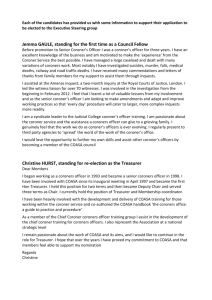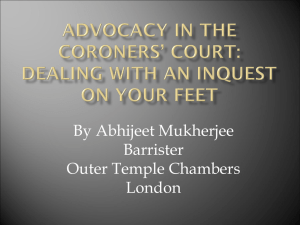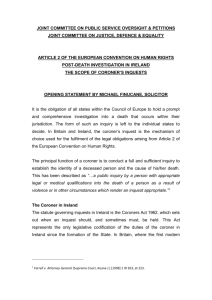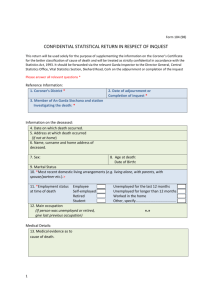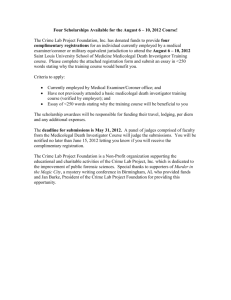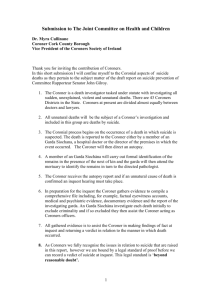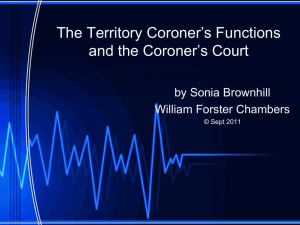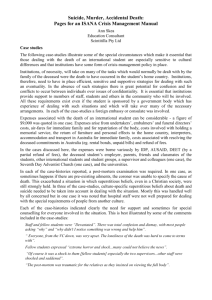AR09-022 - Wyoming State Legislature
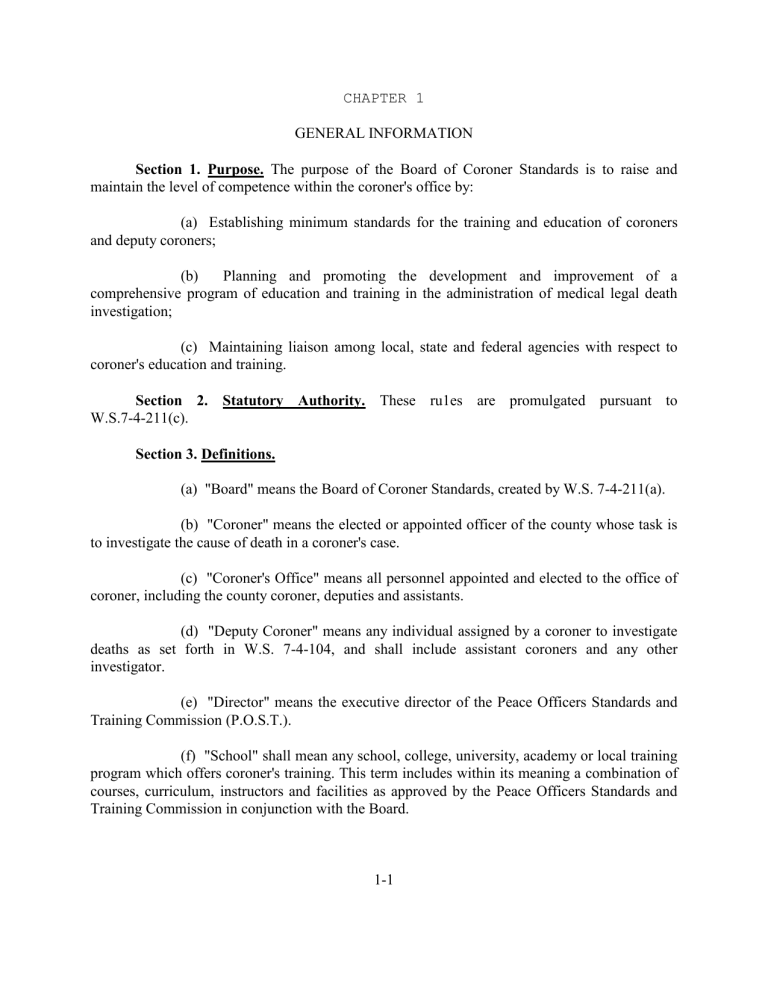
CHAPTER 1
GENERAL INFORMATION
Section 1. Purpose. The purpose of the Board of Coroner Standards is to raise and maintain the level of competence within the coroner's office by:
(a) Establishing minimum standards for the training and education of coroners and deputy coroners;
(b) Planning and promoting the development and improvement of a comprehensive program of education and training in the administration of medical legal death investigation;
(c) Maintaining liaison among local, state and federal agencies with respect to coroner's education and training.
Section 2. Statutory Authority. These ru1es are promulgated pursuant to
W.S.7-4-211(c).
Section 3. Definitions.
(a) "Board" means the Board of Coroner Standards, created by W.S. 7-4-211(a).
(b) "Coroner" means the elected or appointed officer of the county whose task is to investigate the cause of death in a coroner's case.
(c) "Coroner's Office" means all personnel appointed and elected to the office of coroner, including the county coroner, deputies and assistants.
(d) "Deputy Coroner" means any individual assigned by a coroner to investigate deaths as set forth in W.S. 7-4-104, and shall include assistant coroners and any other investigator.
(e) "Director" means the executive director of the Peace Officers Standards and
Training Commission (P.O.S.T.).
(f) "School" shall mean any school, college, university, academy or local training program which offers coroner's training. This term includes within its meaning a combination of courses, curriculum, instructors and facilities as approved by the Peace Officers Standards and
Training Commission in conjunction with the Board.
1-1
(g) "The Act" means W.S. 7-4-103, 7-4-104, 7-4-211, 9-1-634 and 9-1-702(g).
Section 4. Time Computation. In computing any period of time prescribed or allowed by these rules, the day of the act, event, or default from which the designated period of time begins to run shall not be included.
The last day of the period so computed shall be included, unless it is a Saturday, a Sunday, or a legal holiday, in which event the period runs until the end of the next day which is not a Saturday, a Sunday, or a legal holiday.
As used in this rule, "legal holiday" includes New Year's Day, Washington's Birthday, Memorial Day, independence Day, Labor Day, Martin Luther King, Jr., Wyoming Equality Day, Veterans Day, Thanksgiving
Day, Christmas Day, and any other day appointed as a holiday by the President or the Congress of the United
States, or by the governor or the legislature of the State of Wyoming.
Section 5. Board Meetings. The Board shall meet upon call of the chairman as often as necessary to carry out its responsibility. Meetings are open to the public. A majority of the members of the Board constitutes a quorum for the transaction of official business. Minutes shall be kept of all meetings, and a draft submitted to the Director. Upon approval by the Board the minutes shall be maintained by the Director.
(a) Meetings and hearings shall be separate functions.
(b) At least two meetings shall be held each year. W.S. 7-4-211(c).
CHAPTER 2
MINIMUM STANDARDS FOR EMPLOYMENT
Section 1. General Provisions.
(a) Every applicant for employment as a deputy coroner or as an employee of a county coroner in or for the State of Wyoming must meet the following standards and requirements:
(i) Be a United States citizen;
(ii) Be a Wyoming resident;
(iii) Be an adult;
(iv) Provide to the employing coroner fingerprints and other information necessary for a state and national criminal history record background check and release of information as provided in WS 7-19-106(k)(ii) and federal P.L.92-544 and consent to the release of any criminal history information to the employing coroner.
(v) Not have been convicted by any state or federal government of a felony;
(vi) Complete all paperwork required by the Board or Director;
(vii) Hold a high school diploma or evidence of an equivalent achievement .
(b) Every applicant for certification as a coroner or deputy coroner in or for the State of
Wyoming must: submit an Initial Employment Form to the Director of P.O.S.T. within fifteen (15) days of his or her employment.
(c) The standards set forth in W.S. 7-4-103 concerning coroner and deputy coroner qualifications shall be deemed minimum standards and in no way preclude counties from establishing higher employment standards.
CHAPTER 3
CERTIFICATION
Section 1. Minimum Standards for Certification.
(a) Every person who is elected or appointed as a coroner or deputy coroner in or for the State of
Wyoming must satisfactorily complete a Board approved basic coroners' course within one (1) year from the date of appointment, as required by W.S. 7-4-103.
(i) A coroner or deputy coroner that completes a Board approved basic coroners’ course not provided by the Wyoming Law Enforcement Academy (WLEA) must also complete a Wyoming Criminal
Law and Procedures class which includes all subjects covered in that class during a WLEA coroners’ basic course.
(b) Upon meeting the Minimum Standards for Employment in Chapter 2 of these rules and satisfactory completion of these minimum standards for certification, the coroner or deputy coroner will be certified by the Director.
(c) Certification of appointees shall not be deemed indefinite.
Certification shall be effective for two (2) years following basic training and upon issuance of certification by the Board and the Executive
Director of the Peace Officers Standards and Training Commission. Renewal of certification shall be subject to satisfactory completion of continuing education requirements promulgated by the board of coroners standards pursuant to W.S. 7-4-211(c)(iii).
(d) Requirements for the basic training program are set forth by the Board and the Wyoming
Peace Officers Standards and Training Commission.
Section 2. Coroners' Basic Training Program
(a) The basic coroners' training course curriculum shall be approved yearly by the Board.
3-1
CHAPTER 4
SATISFACTION OF MINIMUM TRAINING REQUIREMENTS
Section 1. Minimum Continuing Educational Requirements.
(a) Every coroner or deputy coroner who holds certification is hereby required to meet the continuing educational requirements of twenty (20) hours each two (2) year period.
(b) The continuing educational requirements must be completed no later than two (2) years following the date of satisfactory completion of a required basic coroners’ course and each two (2) year period thereafter.
Subject matter must be related to the duties of coroners.
(c) Upon completion of the continuing educational requirements the coroner or deputy coroner will be recertified by the Director.
(d) Failure of any coroner or deputy coroner to complete requirements of continuing education standards as provided by W.S. 7-4-211(c)(iii) shall result in denial of recertification by the Director.
(e) Any previously certified coroner or deputy coroner who has been denied certification or whose certification has lapsed must successfully complete a required basic coroners’ course within 1 year from the date of appointment, as required by W.S. 7-4-103.
Section 2. Credit for College Semester Hours.
(a) Job related semester credits will be equivalent to ten (10) P.O.S.T. training hours.
(b) College hours can only be applied to continuing education training requirements.
Section 3. Accreditation of Continuing Education or In-Service Training Programs.
(a) A request for accreditation of continuing education or in-service training courses must be completed and submitted to the Peace officers Standards and Training Commission no less than twenty (20) days prior to the start of the scheduled training. The Director shall act on the request within five (5) working days after receipt of the request.
(i) Accreditation requests for training shall include an outline of the course which includes a break down of hours of instruction for the course.
(b) Requirements of the continuing education or inservice training program, which shall be included in the request for accreditation, are:
(i) Subject matter must be related to the duties of the coroner;
(ii) Only courses which meet or exceed one (1) hour of training will be approved;
4-1
(iii) Accreditation will not be granted for roll-call training, field training programs or training involving the exclusive use of tapes, video tapes and training films unless prior approval is granted by the
Board.
(c) The program must provide for a written attendance record. Students enrolled in the training course must attend a minimum of 90% of the course in order to receive accreditation. Partial credit shall not be granted.
(d) A Notice of Course Completion form provided by the Director must be completed, signed by the course coordinator and mailed to the Board upon completion of the course. Training hours cannot be validated until the Notice of Course Completion has been received.
(e) Courses that have hot been pre-approved by the Director may be submitted for credit provided a certificate of successful completion showing one (1) hour or more of training is sent to the Director. If a certificate does not show hours attended, a course outline showing hours attended shall be sent with the certificate before credit will be granted.
(f) Video training, internet training, and law enforcement teleconferencing courses
(i) All training via these media must be tested.
(ii) Certification of the different training programs will be left at the discretion of the Board.
(iii) Coroners and Deputy Coroners can acquire up to one half of the mandated continuing education training hours through these media.
4-2
CHAPTER 5
MINIMUM STANDARDS FOR INSTRUCTORS
Section 1. Minimum Standards for Instructors.
(a) The Director shall certify instructors. Certification will be made on the basis of documented qualifications as shown on the applicant's application for certification.
(b) The Director may deny, or the Peace Officers Standards and Training Commission may suspend or revoke an instructor's certification when the Director finds that the person:
(i) Has failed to meet any of the requirements or qualifications for certification;
(ii) Has failed to remain currently knowledgeable in the person's area of expertise;
(iii) Demonstrates instructional incompetence; or
(iv) Is in violation of the Rules.
(c) Prior to the Peace Officers Standards and Training Commission's action suspending or revoking certification, or the Director's denial of certification, the Director shall notify the individual involved of the deficiency prompting the action. If the deficiency is of such nature that it can be easily corrected the Director may assist the individual in correcting the deficiency before final action is required. If, however, the instructor or applicant is found to be in violation of these rules and the Director's informal efforts have failed or have been deemed inappropriate the Board's suspension or revocation or the Director's denial will be final.
5-1
CHAPTER 6
STANDARDS DEALING WITH THE INVESTIGATION OF CORONER'S CASES
Section 1. Definitions. W.S. 7-4-104 is appended to these standards as Appendix A and adopted and incorporated herein.
Section 2. Conduct. Coroners shall act in accordance with all relevant state and federal law. In addition, in dealing with the deceased, the family of the deceased, and the general public, the Coroners shall conduct themselves in a manner consistent with the highest standards of professionalism, compassion, and respect.
Section 3. General.
(a) The Coroner shall work jointly with all law enforcement agencies having jurisdiction in a death scene investigation.
(b) The Coroner has jurisdiction over and shall take custody of the body.
(c) The Coroner shall assume responsibility for the property of the deceased.
(d) Evidence is the responsibility of law enforcement and/or the Coroner.
(e) The Coroner shall protect the chain of custody for any evidence in their custody.
(f) The Coroner shall provide for transportation, security, and preservation of the deceased until released to the next of kin or their designee.
(g) The Coroner shall pronounce death, and record the date, time, and location.
(h) The Coroner shall provide for the notification of next of kin.
(i) The Coroner shall provide the office staff and investigators:
(i) Safe and adequate equipment to perform any duties of the office; and
(ii) Adequate and appropriate safety and personal protective equipment suitable for the circumstances of the investigation.
Section 4. Investigations.
(a) The Coroner shall identify the deceased and determine the Manner and Cause of death as accurately as possible.
6-1
(b) In determining the Manner and Cause of death, the investigation shall include:
(i) Scene Investigation;
(ii) Toxicology sample on the deceased;
(iii) Inventory of property, evidence, and medications;
(iv) Photographs;
(v) External Exam; and
(vi) DNA sample.
(c) The Coroner shall issue a written report for all death investigations. The written reports may include but are not limited to, data from measuring devices, diagrams, evidence and body labeling, interviews, psychological and social histories, medical histories and consultation with physicians, autopsy, fingerprints, radiology, odontology, or DNA profiles or any other method necessary to determine the cause and manner of death.
(d) Investigations requiring a forensic autopsy of the deceased shall be conducted by a Forensic
Pathologist who has been certified in that specialty by a nationally recognized certification board.
(e) All investigations will be completed in a reasonable time. The term ‘reasonable time’ is defined as that time period necessary to complete and collect data and information from toxicology, autopsy, or other investigation procedures, to determine with medical certainty a manner and cause of death.
Section 5. Records. The Coroner shall maintain all public records in accordance with W.S. 9-2-405 through 9-2-413.
6-2
CHAPTER 7
FORMS
Section 1. Initial Employment Form.
The application by a coroner or deputy coroner for certification shall be made by completing the Initial
Employment Form provided by the Director. APPLICATION MUST BE SUBMITTED TO P.O.S.T. WITHIN
15 DAYS OF APPOINTMENT.
Section 2. Education and Training Record.
Education and training experience of the applicant must be submitted with the Initial Employment Form.
Course certificates and course outlines must be attached.
Section 3. Personnel Change-In-Status Form.
The application by a coroner or deputy coroner for separation shall be made by completing applicable parts of the Personnel Change- In-Status Form. (THIS FORM MUST BE SUBMITTED TO P.O.S.T. WITHIN
15 DAYS OF CHANGE IN STATUS.)
Section 4. Request for Accreditation of In-Service Training Course.
The Request for Accreditation of In-Service Training Course shall be completed and submitted to
P.O.S.T. fifteen (20) days prior to the training course.
Section 5. Application for Instructor Certification.
The application to be completed by an instructor to be submitted to the Director for approval of instructor certification.
Section 6. Other Forms.
The Director shall be responsible for the content and format of all forms used in connection with these rules. Additionally, the Director may adopt forms as necessary to facilitate accomplishment of the various procedures and requirements created by these Rules.
7-1
APPENDIX A
7-4-104. Definitions.
(a) As used in this chapter:
(i) "Coroner's case" means a case involving a death which was not anticipated and which may involve any of the following conditions:
(A) Violent or criminal action;
(B) Apparent suicide;
(C) Accident;
(D) Apparent drug or chemical overdose or toxicity;
(E) The deceased was unattended by a physician or other licensed health care provider;
(F) Apparent child abuse causes;
(G) The deceased was a prisoner, trustee, inmate or patient of any county or state corrections facility or state hospital, whether or not the death is unanticipated;
(H) If the cause is unknown or cannot be certified by a physician;
(J) A public health hazard is presented; or
(K) The identity of the victim is unknown or the body is unclaimed.
(ii) "Coroner's office" means all personnel appointed and elected to the office of coroner, including the county coroner, deputies and assistants;
(iii) "County coroner" means the elected or appointed officer of the county whose task is to investigate the cause of death in a coroner's case;
(iv) "Anticipated death" means the death of an individual who had been diagnosed by a physician acting within the scope of his license as being afflicted with an illness or disease reasonably likely to result in death, and there is no cause to believe the death occurred for any reasons other than those associated with the illness or disease;
(v) "Unattended" means the deceased had not been under the care of a physician or other health care provider acting within the scope of his license within sixty (60) days immediately prior to the date of death.
